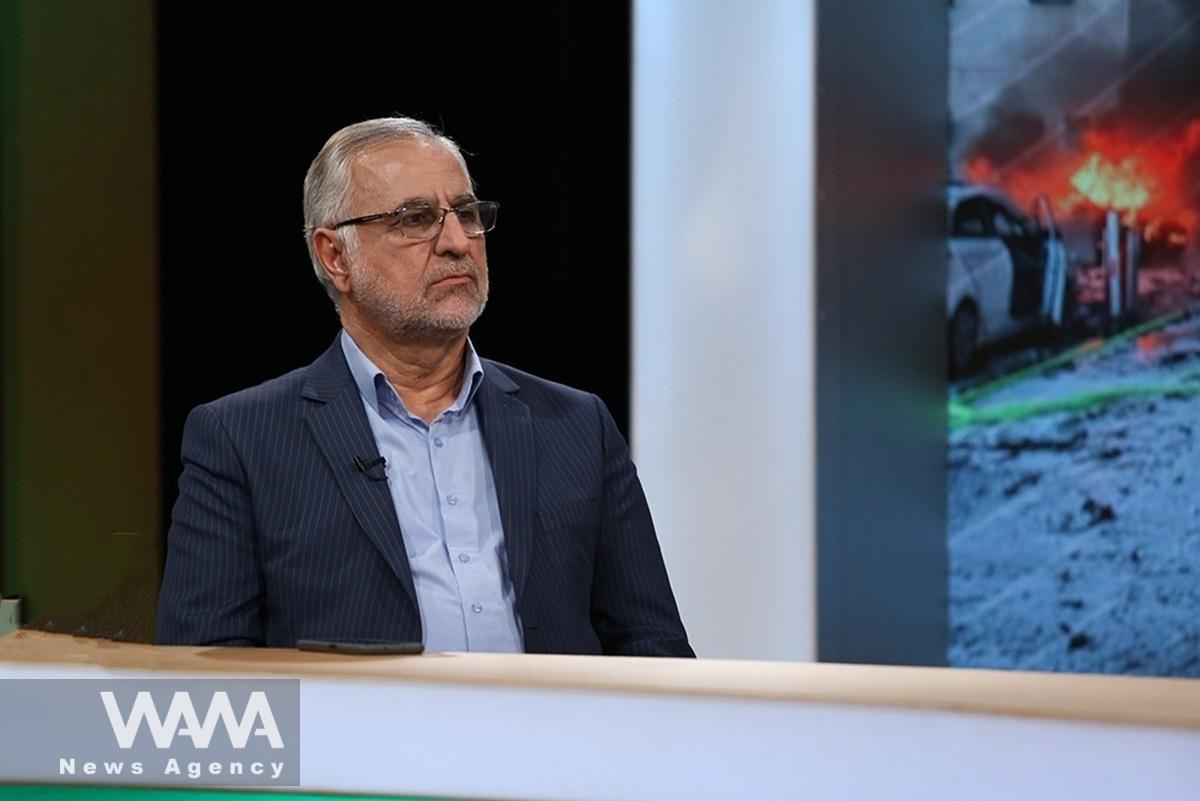Aftershock of an Expert’s Claim about Iran’s Role in Buying Pagers
WANA (Oct 13) – In recent days, remarks made by Masoud Asadollahi, a well-known expert, during a live television program in Iran have sparked one of the most controversial debates of the week.
He unexpectedly claimed that the Islamic Republic of Iran acted as a mediator in purchasing pagers for Hezbollah in Lebanon. These same pagers, he alleged, were used in an Israeli terrorist attack against Lebanon, which resulted in the death and injury of over 4,000 people in Lebanon.
Iran acted as a mediator in purchasing pagers for Hezbollah in Lebanon

Masoud Asadollahi an expert on regional affairs, claimed during a program marking the anniversary of the “Al-Aqsa Storm” that Iran acted as a mediator in purchasing pagers for Hezbollah in Lebanon. Social Media / WANA News Agency
These statements come at a time when the regional situation seems more sensitive than ever, triggering widespread reactions in Iranian and international media and social platforms.
The issue began when Asadollahi, an expert on regional affairs, claimed during a program marking the anniversary of the “Al-Aqsa Storm” that Iran had bought these pagers from a Taiwanese company and handed them over to Hezbollah without conducting proper security checks. He mentioned that 3,000 pagers were distributed, while 2,000 more had yet to be delivered.

Details Behind the Pager Explosions in Lebanon
WANA (Sep 19) – The hacker group “Hanzala” claims to have obtained highly confidential information through recent large-scale cyberattacks. They announced plans to release all related documents in the coming hours. The attack was reportedly carried out by contaminating pager batteries with a heat-sensitive explosive material during the supply chain process in the manufacturing […]
Social media users further fueled the debate, raising questions about the accuracy of this information. Some linked these claims to previous rumors about Iran’s military support for Hezbollah, suggesting that these statements were just a continuation of those old speculations.
Following the broadcast, Iran’s national television quickly responded, stating that these claims were unverified and that Hezbollah had previously denied such allegations.
This swift denial seemed aimed at preventing a potential crisis and containing rumors, but it failed to stop the conversation on social media. Users widely shared the story, questioning Iran’s role in the purchase. Some analysts also used the incident to highlight what they perceived as a lack of accuracy in Iran’s official media.
Mustafa Najafi, a Middle East analyst, was among those who sharply reacted to the claims. On his Twitter account, he wrote: “Contrary to what this state TV expert has said, Martyr Zahedi had explicitly opposed the purchase of pagers from foreign companies before the Israeli attack on Iran’s consulate in Damascus. These irresponsible statements are shocking and belong in tabloid media, not on national TV!”

Will Iran be the next target of Cyber Attack on Pagers?
WANA ( SEP 18) – Simultaneous explosions occurred in Hezbollah’s communication devices in southern Lebanon, Beirut, and eastern Lebanon, resulting in over 1000 injuries and 12 deaths. The explosions, suspected to be a result of Israeli cyber attacks, have raised concerns about the growing threat of electronic warfare in the region. This incident in […]
Meanwhile, Asadollahi was summoned to Iran’s military prosecutor’s office for spreading false information. During the interrogation, he admitted that his sources were unreliable and that, upon further investigation, he realized his mistake.
It remains unclear how his case will be closed, but this legal summons indicates that Iran’s judiciary is highly sensitive about security issues, and spreading false information in this area could have serious consequences.
Despite official denials and efforts by authorities to calm the situation, discussions around the topic continue, highlighting the never-ending sensitivity surrounding Iran-Hezbollah relations and Iran’s role in regional developments.
This incident demonstrates how a single remark, whether true or false, can create a wave that may turn a small mistake into a major crisis.

From Infected Blankets of Native Americans to Infected Pagers in Lebanon!
WANA (Sep 20) – There is a well-known event in the history of science that took place in 1736 AD, after the discovery of the Americas. European and Spanish settlers, in an effort to conquer new lands, waged a major war against the indigenous Native Americans. Despite numerous battles and much bloodshed, the settlers were […]














User comments